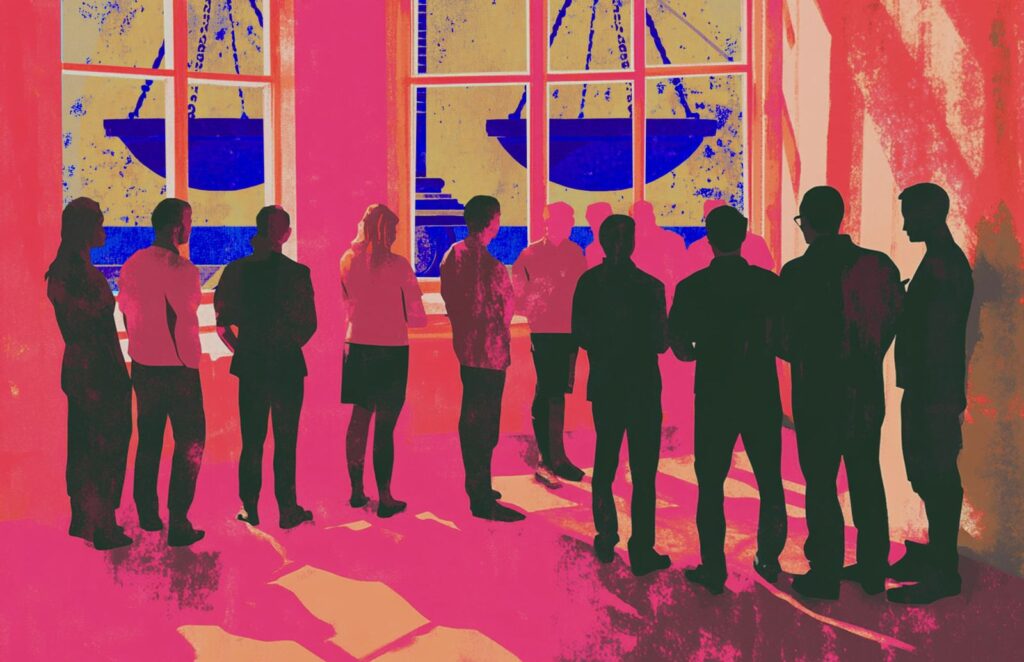
Grassroots justice workers around the world are strategizing how to not only defend but deepen democratic governance.
By Poorvi Chitalkar

Credit: Alejandro Ospina
As I write this, I am on a flight back to the United States after spending a week in Puerto Princesa, Philippines, with 30 grassroots justice advocates from across Latin America, Africa, and Asia. These justice advocates include lawyers, community paralegals, organizers, and researchers. They come from different places and work on diverse issues, but they have a number of things in common. First, they are members of the Grassroots Justice Network—the world’s largest community of practitioners who help communities know, use, and shape the law to advance justice. Second, they are all committed to collective and comparative learning to address the most burning questions facing the grassroots justice movement. Finally, they are operating in political contexts marked by varying degrees of increasing authoritarianism, backsliding democracies, and shrinking civic spaces.
Grassroots justice advocates are at the frontlines of crackdowns on civil society. Many face attacks, arrests, and threats. In 2023, nearly 70% of the members of our network said that they struggled to engage in legal empowerment work in their countries’ political and social contexts. In the same survey, about half of the respondents reported that they, or the communities that they work with, had been threatened, arrested, or harassed while pursuing justice in the previous year.
Legal empowerment efforts combine law and organizing to build the power of communities so that they can drive systemic change. But in many places, the law is being weaponized as a tool for oppression. And the work of community organizing is more challenging when public assemblies are restricted, activists are surveilled, and the media is tightly controlled. At a time when grassroots justice advocates are trying to increase the leadership and participation of communities in decision-making spaces, communities are facing increasing risks that dissuade them from mobilizing.
As anti-democratic norms gain traction, practitioners struggle to find the space to advocate for public participation, accountability, and community-led solutions to development challenges. As Catalina Marino from Asociación Civil por la Igualdad y la Justicia says, “The political context is not good for social justice. It’s not only that we won’t have the resources. But also we are dealing with a public discourse that is not open to hearing claims that are framed in rights-based language. We will not be able to convince any government official that people have rights to do something because they don’t see reality through that lens.”
How do we combine the power of law and organizing to advance social and environmental justice in contexts of closing civic spaces? How do we counter anti-democratic narratives with a bolder, positive vision of a just and equal world? These are the burning questions that members of our network are coming together to answer collectively.
It seems clear that there is now a playbook of repression—that is, a striking similarity in the patterns of repressive techniques being used across regional and political contexts to curtail the work of civil society. Network members have outlined a playbook of justice—their response to counter the rising ride of authoritarianism and offer a deeper version of democracy, where public institutions are accountable and responsive, and citizens are empowered to shape the decisions that affect their lives. The following are a few of the most prominent themes:
In the Grassroots Justice Network, learning has always been deeply tied to collective action and solidarity. In 2021, immediately following the military coup in Myanmar, members from Thailand, Cambodia, and South Africa gathered to tell their colleagues in Myanmar, “You are not alone,” and shared their own experiences fighting authoritarianism as inspiration. As we gathered in the Philippines last week, members communicated the strategies that they were using to expand community participation in decision-making or to engage state institutions. They celebrated their wins and brainstormed solutions to shared challenges.
I leave Puerto Princesa feeling hopeful. Not only are these grassroots justice advocates implementing the playbook of justice in their own contexts, but they are also showing up to share their strategies with each other, lending support to campaigns and building a network of care. Further, by collectively solving the burning questions that face the grassroots justice movement as a whole, they are laying a strong foundation for democracy and justice to thrive in the long term.
Poorvi Chitalkar is a learning agenda specialist at Namati, where she supports practitioners across the grassroots justice network looking to engage in collective learning, test their methods, and generate new evidence and knowledge on the frontiers of the legal empowerment field. Recently, she has authored How Legal Empowerment Efforts are Fighting Repression and Deepening Democracy and serves as the host of the podcast series A Common Pot: Stories and Recipes for Grassroots Justice.
This article was first published by Open Global Rights. It has been republished with permission. See other blogs in this series here.